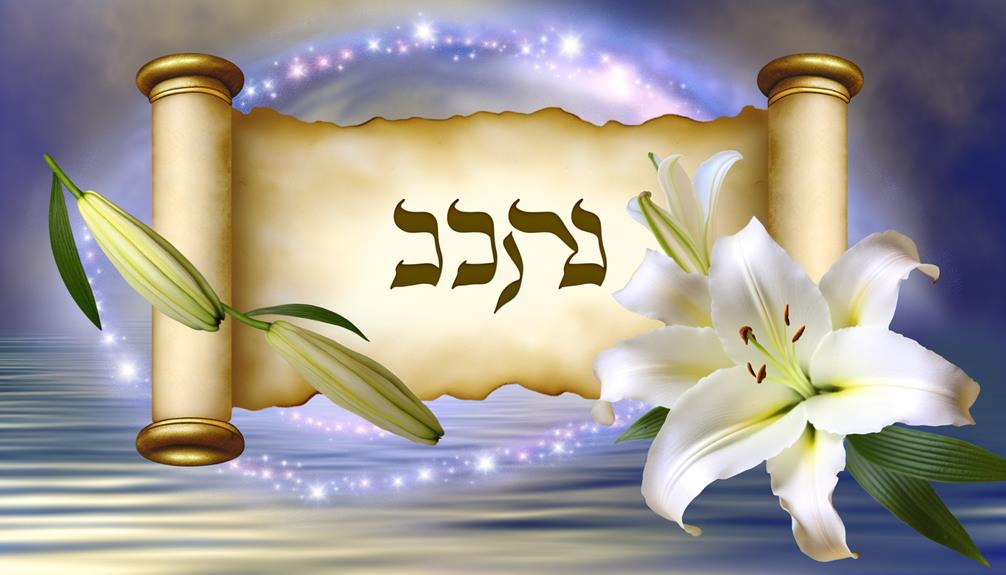Meaning of Name Leah in Hebrew
In Hebrew, Leah means "weary" or "delicate," deriving from the word 'Le'ah.' This name, rich in history, was borne by the first wife of Jacob and mother of six tribes of Israel, embodying themes of perseverance and divine favor. Leah is celebrated in Hebrew tradition for her resilience and maternal strength, and her story is extensively detailed in the Book of Genesis.
Today, the name Leah remains popular in various cultures, resonating due to its deep biblical roots and timeless charm. To appreciate the full depth of Leah's significance, the various cultural and historical nuances are fascinating to explore.

Key Takeaways
- The name Leah is derived from the Hebrew word 'Le'ah.'
- In Hebrew, Leah can mean "weary" or "delicate."
- Leah is a significant biblical figure, the first wife of Jacob.
- Leah's name reflects themes of perseverance and divine favor.
- The name Leah carries cultural and spiritual significance in Hebrew tradition.
Etymology and Origins
The name Leah, rooted in Hebrew etymology, is traditionally believed to mean 'weary' or 'delicate' and holds significant historical and cultural connotations.
You'll find that the name Leah is derived from the Hebrew word 'Le'ah' (לֵאָה), which conveys a sense of weariness or delicacy. This etymology may reflect the linguistic and cultural nuances of ancient Hebrew society, where names often encapsulated personal attributes or life circumstances.
Surprisingly, some scholars also suggest that Leah could be linked to an Akkadian word, 'littu,' which means 'cow,' symbolizing fertility and motherhood. Understanding these layered meanings provides a richer appreciation of the name's depth and its relevance throughout history.
Biblical References
In biblical narratives, Leah emerges as a prominent figure, particularly as the first wife of Jacob and the mother of six of the twelve tribes of Israel. Her story is intricately detailed in the Book of Genesis. Leah's marriage to Jacob, often overshadowed by her sister Rachel's beauty, highlights themes of love, duty, and divine favor. Leah bore Jacob six sons and one daughter, each with significant roles in Israel's history.
| Child | Tribe | Biblical Reference |
|---|---|---|
| Reuben | Tribe of Reuben | Genesis 29:32 |
| Simeon | Tribe of Simeon | Genesis 29:33 |
| Levi | Tribe of Levi | Genesis 29:34 |
| Judah | Tribe of Judah | Genesis 29:35 |
| Issachar | Tribe of Issachar | Genesis 30:18 |
| Zebulun | Tribe of Zebulun | Genesis 30:20 |
Her legacy continues to shape biblical scholarship and religious traditions.
Cultural Significance
How does the name Leah resonate within various cultural contexts, reflecting its enduring significance across different societies and historical periods?
Leah's name, rooted in Hebrew tradition, has crossed cultural boundaries, retaining its charm and profundity. Here are four notable cultural impacts:
- Hebrew Tradition: Leah is one of the matriarchs in Judaism, symbolizing dedication and resilience.
- Literature and Arts: Characters named Leah appear in various literary works, showcasing its timeless appeal.
- Modern Popularity: Leah remains a popular name in contemporary Western societies, often chosen for its historical depth.
- Global Usage: The name has been embraced in diverse cultures, sometimes with variations in pronunciation and spelling.
Each of these aspects underscores Leah's cultural significance, highlighting its multifaceted resonance across time and place.
Spiritual Interpretations
Leah's name, deeply entrenched in Hebrew scripture, carries profound spiritual meanings that reflect themes of perseverance, divine favor, and maternal strength. When you delve into Leah's story, you see how she embodies resilience despite personal struggles. Her journey reveals divine favor as she becomes the mother of six of Jacob's twelve sons, a proof of her pivotal role in the foundation of the Israelite tribes.
| Theme | Spiritual Interpretation |
|---|---|
| Perseverance | Leah's unwavering spirit |
| Divine Favor | Blessings of numerous offspring |
| Maternal Strength | Nurturing and protective nature |
Understanding Leah's name spiritually deepens your appreciation of her legacy. Her life's trials and triumphs highlight enduring faith and the rewards of steadfast devotion.
Modern Usage
You'll find that the name Leah remains popular among Israelis, reflecting both historical and cultural significance.
Contemporary interpretations often highlight its timeless charm and strong biblical roots, making it a favored choice for parents.
This modern usage underscores a blend of tradition and present-day relevance, illustrating the name's enduring appeal.
Popularity Among Israelis
Despite the passage of time, the name Leah remains a popular choice among Israeli parents, reflecting both cultural heritage and contemporary trends.
You'll find that Leah's popularity in Israel is driven by several key factors:
- Biblical Significance: Leah, one of the matriarchs, holds a revered place in Jewish tradition.
- Cultural Resonance: The name resonates deeply within the Israeli cultural and historical context.
- Modern Appeal: Simple yet elegant, Leah fits well with current naming trends.
- Pronunciation and Spelling: Easy to pronounce and spell in both Hebrew and English, making it versatile.
Contemporary Interpretations
In modern usage, the name Leah has evolved to encompass not only its rich historical and biblical roots but also a contemporary charm that appeals to parents across various cultures.
You'll find Leah frequently chosen for its simplicity, elegance, and timeless resonance. While it retains its Hebrew origin, meaning 'weary' or 'delicate,' modern interpretations often focus on its phonetic beauty and ease of pronunciation. Its versatility makes it a popular choice across different cultures and languages, effortlessly adapting to various naming traditions. Similar to the meaning of the name Lynn, which signifies “lake” or “waterfall” in its Celtic roots, Leah evokes a sense of gentle grace and natural beauty. Together, these names share a refreshing simplicity that appeals to parents seeking timeless and serene options for their child.
Parents today appreciate Leah for its versatility; it effortlessly fits into diverse linguistic and cultural contexts. Additionally, popular culture has embraced the name, with notable figures and characters named Leah further boosting its appeal.
Therefore, Leah continues to be a favored choice for those seeking a name that balances tradition and modernity.
Popularity Over Time
Over the centuries, the name Leah has experienced fluctuating levels of popularity, reflecting cultural and societal changes. Historically, Leah's prevalence has varied based on religious influences, literary works, and regional trends.
You can observe these shifts through different periods:
- Biblical Era: Leah was common among Hebrew communities, given its biblical origins.
- Medieval Period: The name saw a decline, influenced by changing naming conventions.
- 19th Century: Victorian England witnessed a resurgence of biblical names, including Leah.
- Modern Times: Leah's popularity has remained steady, bolstered by its timeless charm and simple elegance.
Understanding these trends provides a richer perspective on how cultural contexts shape naming practices over time.
Variations and Nicknames
Many variations and nicknames for the name Leah have emerged across different cultures and languages, reflecting its widespread appeal and adaptability.
In English-speaking countries, you might encounter nicknames like Lee or Lia, which maintain the name's simplicity and elegance.
In Hebrew, variations such as Le'ah or Laya emphasize its original form and pronunciation.
Other cultures have their own adaptations; for instance, the French often use Léa, while in Spanish-speaking regions, you might hear Leia.
These variations and nicknames not only highlight the name's versatility but also its ability to seamlessly blend into various linguistic traditions.
Understanding these differences allows you to appreciate the global resonance of the name Leah, underscoring its enduring charm and cultural significance.
Conclusion
In understanding Leah, you've journeyed through ancient texts like Jacob's ladder, uncovering layers of history, spirituality, and culture.
Her name, rooted in Hebrew etymology, resonates with timeless significance.
Whether you encounter Leah in biblical narratives or modern settings, you'll appreciate its rich tapestry of meanings.
Just as Leah's story intertwined with the fabric of her time, so does the name Leah weave through the tapestry of history, embodying resilience and grace.






